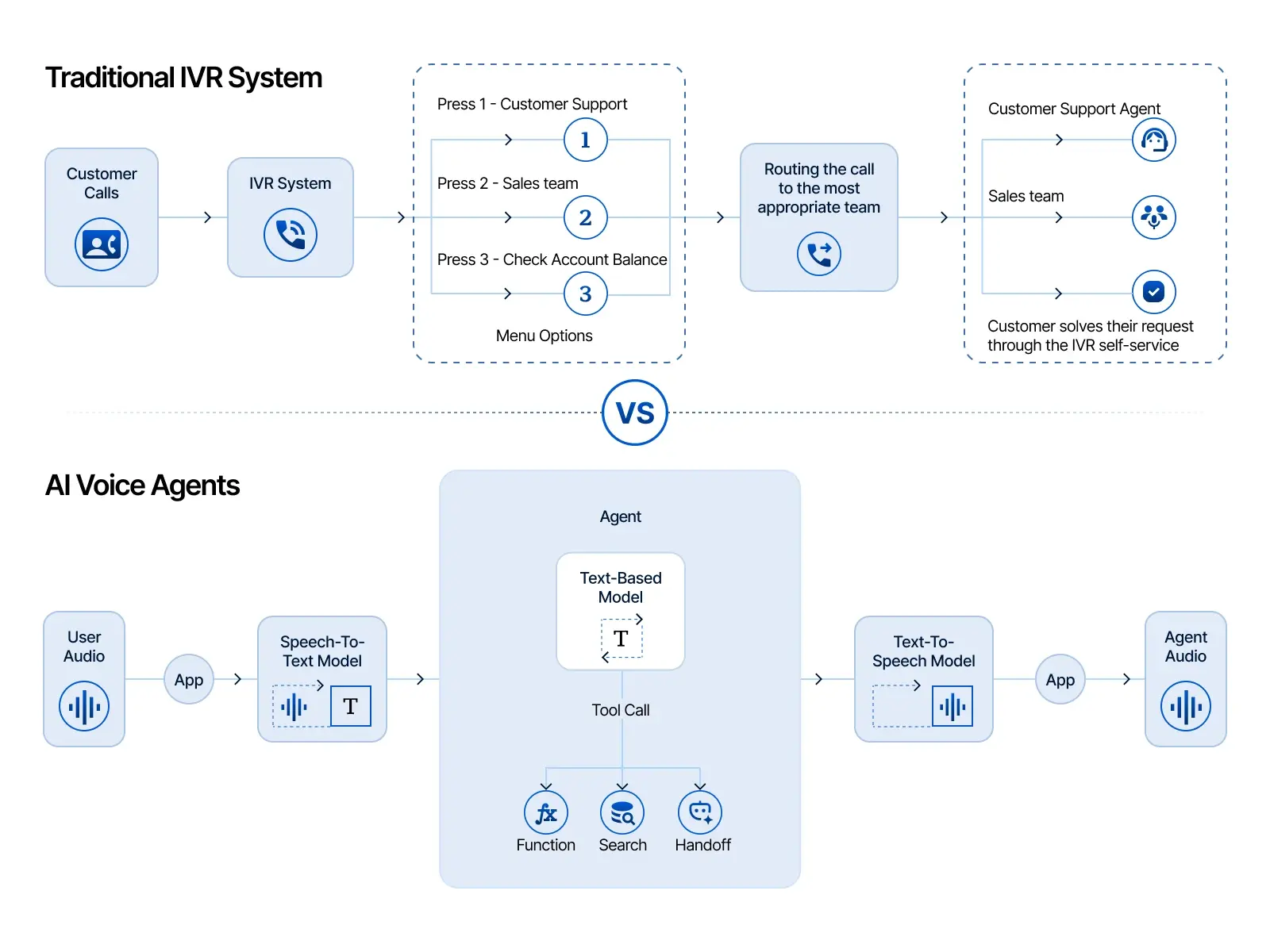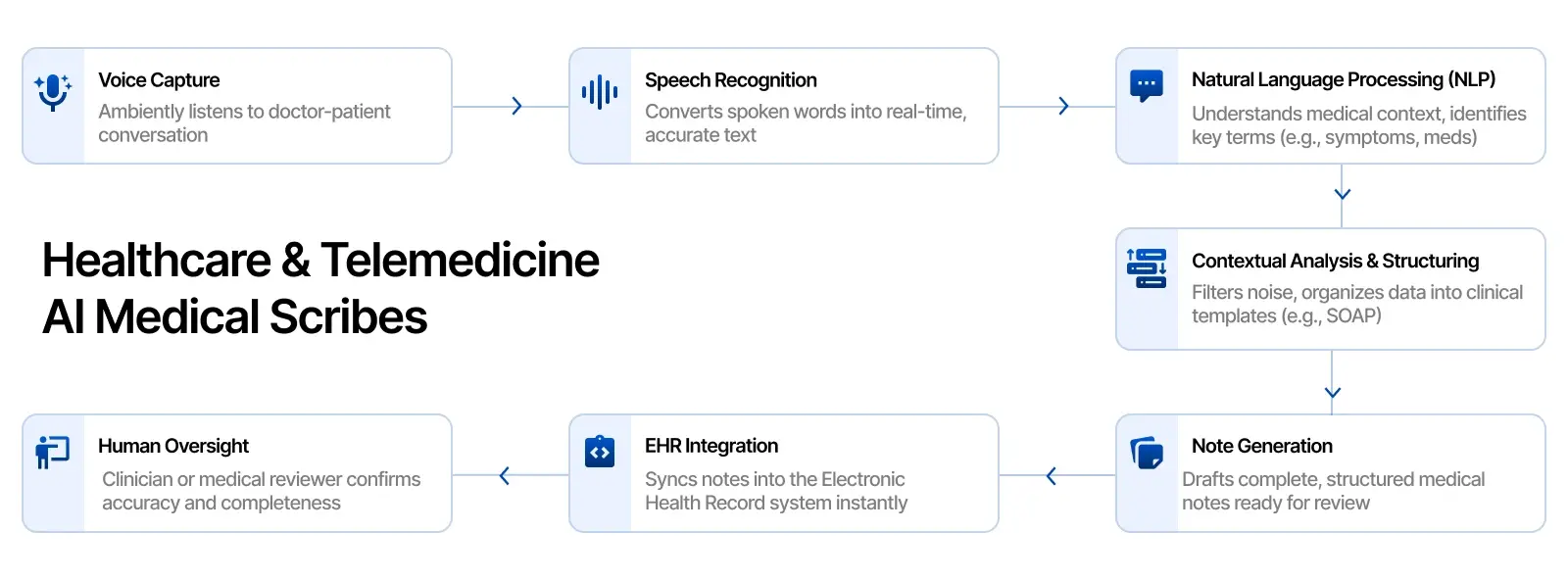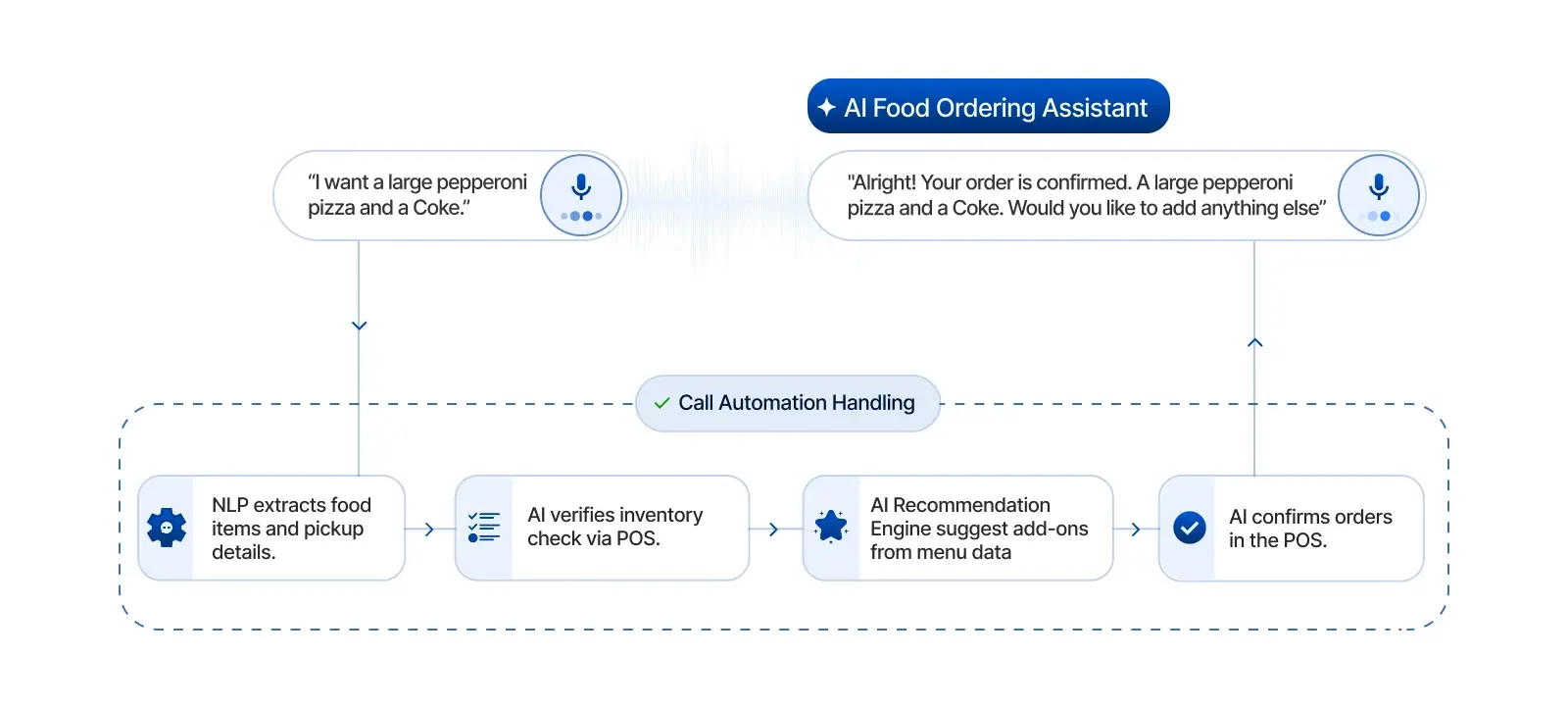AI Voice Agent Use Cases: Powerful Applications Across Industries
AI voice agents are no longer experimental – they are becoming the new standard for how businesses interact, respond, and scale. Far beyond simple voice bots or outdated IVR systems, today’s AI voice agents use speech recognition, natural language processing, and real-time data access to handle complex conversations with human-like fluency.
From booking appointments and qualifying leads to resolving customer issues and automating sales outreach, these intelligent agents are being adopted across industries to streamline workflows, reduce operational costs, and enhance customer experiences.
According to Gartner, by 2029, agentic AI will autonomously resolve 80% of common customer service issues without human intervention, signaling a major shift in how voice agents and digital assistants are transforming customer interactions. And with the global voice AI market projected to reach $47.5 billion by 2034, the shift toward voice-first automation is accelerating fast.
In this blog, we will explore the most impactful AI voice agent use cases across sectors like retail, healthcare, and finance. Also, we will uncover why they are gaining momentum now and how they are helping businesses to grow!
Why Are AI Voice Agents Gaining Momentum?
AI voice agents are emerging as one of the most impactful technologies in business operations today. These systems are designed to understand spoken language, interpret intent, and respond naturally – handling everything from customer queries and appointment scheduling to order processing and lead qualification.

Unlike traditional IVR systems or basic chatbots, AI voice agents leverage advanced technologies such as automatic speech recognition (ASR), natural language processing (NLP), and text-to-speech (TTS) to deliver fluid, context-aware conversations. The result is a faster, more accurate, and more human-like interaction.
The adoption of voice agent use cases is accelerating now for several reasons:
1. Faster Response Times
Customers receive immediate assistance without long wait times or call transfers.
2. Seamless Scalability
Voice agents can handle thousands of calls simultaneously, which makes them ideal for high-volume businesses.
3. Operational Efficiency
Automating repetitive voice tasks significantly reduces costs while maintaining service quality.
4. Personalized Experiences
These voice-based systems can access customer history and preferences to tailor responses and recommendations.
5. Revenue Recovery
By handling calls instantly, recommending upgrades or add-ons, and processing transactions on the spot, voice agents help prevent lost sales opportunities.
As digital transformation accelerates, more businesses are recognizing the AI voice agent use cases not just as support roles. But as strategic assets – capable of driving growth, improving customer satisfaction, and supporting 24/7 operations. Let’s further check the AI voice agent industry applications.
AI Voice Agent Use Cases: 45+ Applications Across Industries
AI voice agents are no longer niche tools; they are becoming mission-critical assets across industries. They are addressing persistent operational pain points and transforming the way businesses interact with customers. From automating healthcare documentation to streamlining logistics and handling multilingual travel bookings, these intelligent systems are redefining service delivery, efficiency, and customer engagement.
Here’s how industries are leveraging AI voice agent applications:
1. Healthcare & Telemedicine
Pain Points: Administrative overload, long wait times, care coordination gaps
- AI Medical Scribes: AI medical scribes automatically document patient visits in real time, thus reducing the documentation burden on clinicians and improving accuracy in EHRs.

- Patient Intake & Triage: Conduct voice-based pre-consultation interactions to capture symptoms, assess urgency, and route patients efficiently.
- Chronic Care Management: Provide daily reminders and check-ins for patients with conditions like diabetes or hypertension.
- Older People Assistance: Offer empathetic support through medication alerts, physician visit scheduling, and wellness checks – especially for home-bound patients.
- Follow-Ups & Feedback: Collect post-visit insights and detect early signs of dissatisfaction or non-compliance.
- Healthcare Patient Engagement: Engage patients actively through reminders, voice surveys, and health plan support.
Outcome: Reduced staff burnout, enhanced patient experience, faster and more informed care delivery.
2. Retail & E-commerce
Pain Points: High support volume, cart abandonment, and limited personalization
- Voice-Based Product Recommendations: Serve as digital personal shoppers, guiding users through purchase options based on voice input.
- Order Status & Returns: Instantly answer “Where’s my order?” and simplify returns with voice-led workflows.
- Inventory Queries: Let customers check availability via voice – boosting conversion on high-intent queries.
- Upselling & Add-ons: Suggest complementary items during voice interactions.
- Inbound Sales Qualification: Agents can answer product questions, qualify purchase intent, and route hot leads to reps.
Outcome: Higher cart values, 24/7 customer support, improved post-purchase engagement.
3. Finance & Banking
Pain Points: Long call queues, compliance needs, fraud threats
- Account Info & Transaction Support: Deliver real-time account updates or balance checks without app logins.
- Fraud Detection: Notify customers of suspicious activity and enable immediate confirmation or escalation.
- Loan Prequalification: Guide users through eligibility checks and schedule callbacks if needed.
- Portfolio Monitoring: Investors ask, “How’s my portfolio today?” and receive an instant update.
Outcome: Streamlined customer service, improved security, better-qualified leads.
4. Hospitality & Travel
Pain Points: Booking delays, language barriers, fluctuating occupancy
- Multilingual Reservations: Assist users across regions with seamless booking and inquiry handling.
- Check-In & Customer Support: Offer touchless and voice-led check-ins and answer questions about policies or amenities.
- Occupancy & Route Updates: Update travelers about changes in booking, transport availability, or expected arrival times.
- Personalized Guest Services: Agents manage restaurant reservations, room service orders, and event reminders.
- Virtual Front Desk: Agents greet callers, handle FAQs, route requests, and manage lobby queues.
Outcome: Higher guest satisfaction, operational efficiency, and global accessibility.
5. Real Estate
Pain Points: Missed leads, manual scheduling, information overload
- Property Discovery: Voice-guided exploration of listings with instant answers to size, amenities, and pricing.
- Tour Booking & Screening: Schedule viewings and qualify prospects based on budget/location preferences.
- Lease Application Help: Guide users step-by-step through rental application procedures.
Outcome: Faster lead conversion, better agent productivity, enhanced user experience.
6. Restaurants & FoodTech

Pain Points: Reservation backlogs, dietary inquiries, and fragmented feedback
- Reservation Management: Automate to book a table for four at 8 PM.” The agent by call confirms and syncs with the POS.
- Food Ordering Assistant: Agents take complex orders, offer menu info, confirm preferences, and process payments.
- Menu Navigation: Provide allergy, vegan, or dietary-friendly suggestions instantly.
- Customer Feedback Collection: Replace slow surveys with instant, conversational feedback post-dining.
For instance, Markovate developed the Smarteats app through which users can log meals or retrieve nutritional info using simple voice commands, enabling faster, more intuitive food tracking.
Outcome: Increased loyalty, faster order management, stronger operational consistency.
7. Logistics & Delivery
Pain Points: Failed deliveries, tracking confusion, driver coordination
- Real-Time Tracking: Answer “Where is my package?” instantly by voice.
- Address Changes & Reschedules: Let users update delivery preferences mid-transit.
- Driver Coordination: Provide route updates and check-in features for last-mile efficiency.
Outcome: Fewer delivery failures, faster support resolution, leaner logistics.
8. Public Services & Government
Pain Points: Staff shortages, limited accessibility, multilingual demand
- Utility Payment Reminders: Notify citizens about due bills and payment options.
- Transit or Election Info: Provide real-time updates on transport status or polling locations.
- Emergency Hotlines: Share safety information, shelter details, and helpline contacts in crises.
Outcome: Reduced strain on call centers, enhanced civic access, scalable citizen services.
9. HR & Internal Operations
Pain Points: High query volume, manual scheduling, hiring delays
- Candidate Pre-Screening: Voice agents ask qualification questions, capture responses, and pass summaries to recruiters.
Example: Markovate’s AI Interview Agent proactively contacts candidates, conducts pre-screening by voice, records responses, and updates the score – reducing recruiter outreach time significantly.
- Interview Scheduling Assistant: Coordinate across time zones, send invites, and follow up with reminders.
- Policy FAQs: Respond to questions about leaves, benefits, or company policies using real-time voice queries.
- PTO Balance Checker: Employees can instantly check vacation or sick leave balances through secure voice access.
- Internal Alerts & Notifications: Broadcast updates on IT outages, HR deadlines, or company events with confirmation options.
- Application Status Notifier: Keep applicants updated on hiring status to reduce follow-up queries.
Outcome: Faster hiring decisions, fewer HR tickets, improved employee satisfaction.
10. Education
Pain Points: Administrative overload, inconsistent student engagement, limited support hours
- Admission Support Assistant: AI voice agents guide prospective students through application steps, share program details, and answer FAQs – reducing manual follow-ups.
- Class Scheduling & Reminders: Automatically inform students about class times, changes, or deadlines via conversational voice prompts.
- Exam Info & Results Queries: Handle high-volume queries around exam schedules, results, and grading policies through instant voice responses.
- Parent Communication: Notify parents about attendance, performance updates, or urgent school announcements in their preferred language.
- 24/7 Campus Helpdesk: Voice agents provide round-the-clock assistance with common queries like login issues, library hours, or tuition deadlines.
- Voice-Based Learning Assistant: Enable students to practice oral quizzes, schedule study sessions, and request summaries through natural conversations.
Outcome: Reduced administrative load, improved communication, and a more responsive learning environment.
Read more AI use cases in education in this blog!
So, from healthcare to hospitality to finance, AI voice agent use cases are proving their versatility and value.
In the next section, we will explore how Markovate’s enterprise-grade voice agent platform helps businesses build these custom solutions – designed to scale, secure, and deliver measurable ROI.
Building Smarter Voice Experiences with Markovate
Markovate brings deep expertise in conversational AI, large language models, and enterprise-grade deployments – helping businesses unlock new levels of automation and engagement through voice. From healthcare to retail, logistics to HR, our custom AI solutions are built for scale, accuracy, and speed.
With our AI Voice Agent Platform, businesses get a unified, secure, and easily extensible system to launch voice agents tailored to their exact needs – fast.
What sets our platform apart?
- No-Code Voice Agent Builder: Design, deploy, and manage AI voice agents through an intuitive visual interface – ideal for non-technical teams and rapid prototyping.
- Context-Aware Conversations: Real-time memory, personalization, and language understanding ensure natural interactions.
- Enterprise-Ready: Built with scalability, privacy, and compliance in mind – across industries.
- Customizable for Any Use Case: From inbound support to interview screening, the platform you build adapts to your goals.
Case in Point: DeVoice – AI Voice Ordering for Restaurants
One of our implementations, DeVoice, is a voice ordering agent designed for the food service industry. DeVoice handles inbound calls, takes complex orders, manages customizations, processes payments, and even suggests upsells – entirely through natural, real-time voice interaction.
Impact
- Reduction in order processing time
- Increased order accuracy with real-time voice confirmations
- Improved customer experience through hands-free interactions
- Higher repeat orders and operational efficiency for restaurants
Explore more on how DeVoice is redefining voice-first food ordering!
Whether you’re improving CX, boosting operational efficiency, or reducing support costs, Markovate helps you bring voice intelligence to life.
Sum Up: AI Voice Agent Use Cases Transforming Businesses
AI voice agents are transforming business communication, from streamlining customer support to unlocking new levels of personalization and automation across industries. What was once a novelty is now a competitive necessity.
At Markovate, we see voice AI not just as a support tool, but as a strategic advantage. Our work across healthcare, retail, recruitment, and food tech has shown how well-designed voice agents can enhance user experience, recover revenue, and reduce operational load.
As voice technology evolves, becoming more intelligent, multilingual, and integrated, the opportunity to build full-service AI-powered agents is growing fast.
Ready to modernize how your business communicates?
Partner with Markovate to design and deploy voice agents that drive real impact: securely, scalably, and on your terms.
FAQs: AI Voice Agent Use Cases
1. Can AI voice agents support multiple languages?
Yes, many AI voice agents are built to be multilingual. They can understand and respond in several languages, which makes them ideal for global audiences.
2. How do AI voice agents learn?
AI voice agents learn through a combination of pre-trained language models and continuous training on real-world conversations. They are initially trained on large datasets of human dialogue, then fine-tuned using industry-specific data and user feedback. Over time, they improve by analyzing interactions, recognizing patterns, and adapting to new queries, which makes them smarter and more accurate with use.
3. How do AI voice agents ensure data privacy and security?
AI voice agents are built with strict security standards to protect sensitive data. They typically use end-to-end encryption, access controls, and secure storage. Depending on the industry and region, solutions are designed to comply with applicable regulations, such as HIPAA, or other data protection laws. Many platforms, like our AI voice agent platform, also offer private cloud or on-premise deployment for businesses that need full control over their data.


